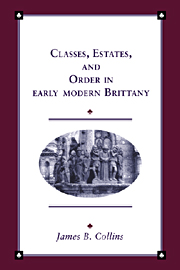Book contents
- Frontmatter
- Contents
- Preface
- List of abbreviations
- Glossary of French terms
- Introduction
- 1 The Breton economy in the sixteenth and seventeenth centuries
- 2 Elements of Breton society
- 3 Institutional structures of political control – financial and judicial organization
- 4 The Estates of Brittany and the Crown, 1532–1626
- 5 The Estates of Brittany and the Crown, 1626–1675
- 6 The burden of Breton taxation
- 7 The problem of order
- Conclusion
- Appendix
- Bibliography
- Index
- CAMBRIDGE STUDIES IN EARLY MODERN HISTORY
7 - The problem of order
Published online by Cambridge University Press: 06 October 2009
- Frontmatter
- Contents
- Preface
- List of abbreviations
- Glossary of French terms
- Introduction
- 1 The Breton economy in the sixteenth and seventeenth centuries
- 2 Elements of Breton society
- 3 Institutional structures of political control – financial and judicial organization
- 4 The Estates of Brittany and the Crown, 1532–1626
- 5 The Estates of Brittany and the Crown, 1626–1675
- 6 The burden of Breton taxation
- 7 The problem of order
- Conclusion
- Appendix
- Bibliography
- Index
- CAMBRIDGE STUDIES IN EARLY MODERN HISTORY
Summary
What was order to a seventeenth-century Breton? The ruling elites sought always to impose their version of order, yet they themselves often disagreed as to what order they would impose. The traditional formulation, the society of orders, of the three orders of prayers, fighters, and workers, continued to define the legal and political system, but a new political formulation, revolving around the divinely anointed king, increasingly competed with it. Order meant one religion; it meant respect for property; it meant the continued social and political preeminence of landed nobles; it meant strengthened male control of women (and, by extension, of families). Order was political and social but also moral. The authorities and the other forces of order had to restrict popular political action. Because they defined the moral as political, they believed that they had to supervise morality closely to preserve the political (and social) order.
The authorities relied on a broad social coalition to preserve order: on all those with a stake in the system. The coalition included the nobles, legal people, and merchants but also a wide range of humbler citizens – guild members and shopkeepers in the towns, the ploughmen in the villages. The one element that united all members of the forces of order was property. The purpose of society, as John Locke said in 1679, was the preservation of property – of lives, liberties, and estates. Whether we look with Foucault at the “insane” or with Muchembled at the moral and then legal “criminalization” of certain forms of behavior, everywhere we see the intense concern with the connection between immoral behavior, social and political dissolution, and the preservation of property.
- Type
- Chapter
- Information
- Classes, Estates and Order in Early-Modern Brittany , pp. 249 - 270Publisher: Cambridge University PressPrint publication year: 1994

